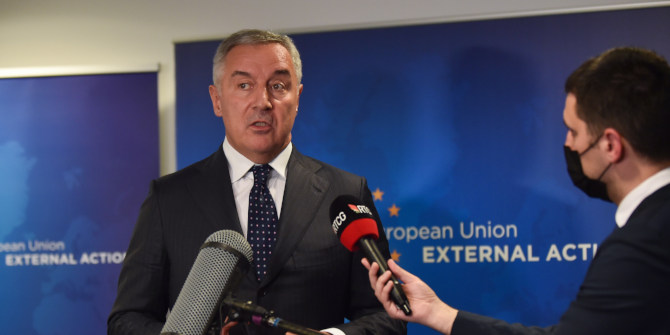Spain’s prime minister, Pedro Sánchez, has called a snap general election for 23 July. Paul Kennedy and David Cutts assess whether the election could lead to a change of government and the return of the far-right to office in Spain for the first time since Francisco Franco’s death in 1975.
Having developed a reputation as a high-stakes gambler with an uncanny knack of beating the odds, Spain’s prime minister, Pedro Sánchez, again caught just about everyone off-guard – including his own party, the Spanish Socialist Workers’ Party (PSOE) – when he announced on the morning after the PSOE suffered a bitterly disappointing set of results at regional and local elections held on 28 May that the general election would be brought forward five months to 23 July.
Previous surprises had been provided when he called successive general elections in April and November 2019 after having become prime minister the previous year as the only ever political leader to win a vote of confidence, thereby dislodging the corruption-tarnished centre-right People’s Party (PP) from office. The fact that he led a party which then only held 84 of the 350 seats in the Lower House, the Congress of Deputies, indicates how audacious Sánchez was, and how adept he was at securing sufficient support from other parties to replace the then prime minister, Mariano Rajoy.
Realistically acknowledging the harsh reality of the PSOE’s reduced circumstances within a volatile and fast-moving environment which had replaced a two-party system that stretched back to the 1980s, Sánchez had little choice other than to display a facility for compromise with other parties – in the face of considerable criticism from prominent figures within the PSOE. His immediate predecessor as party leader, Alfredo Pérez Rubalcaba, dubbed the coalition government formed in December 2019 with the Pablo Iglesias-led anti-austerity Unidas Podemos a ‘Frankenstein’ administration.
The supposedly unnatural coalition has nevertheless enjoyed considerable success in office, effectively neutralising the tense situation in Catalonia bequeathed by Mariano Rajoy, steering the country through the Covid-19 pandemic and subsequently securing significant Covid recovery funding from the EU, and pursuing a relatively progressive economic policy which received plaudits from European Commission President Ursula von der Leyen – inflation had fallen to below 3% at the time of writing.
Pensions and the minimum wage were increased, and the harsh Labour Reform introduced by the PP government in 2012 was replaced by new legislation under the capable leadership of Labour Minister, Yolanda Díaz. Díaz was able to build an enviable profile on the back of that success, establishing herself as leader of the movement unifying political forces to the PSOE’s left under the heading Sumar.
A resurgent right
The coalition government nevertheless obtained scant reward for its record in office at the local and regional elections held on 28 May. How are we to explain the result? Notwithstanding the usual caveats of translating local polls to a general election, the results reaffirm the increasingly polarised nature of Spanish politics.
Firstly, the right has done well at the last three significant regional elections in Madrid (May 2021), Castille and Leon (February 2022) and Andalusia (June 2022). The decision to replace the hapless PP leader Pablo Casado with the more moderate Alberto Feijóo in April 2022 also appears to have benefited the party’s fortunes, although relations with Madrid’s populist regional President, Isabel Ayuso, who obtained an overall majority at the May 2023 regional election – further burnishing, in the opinion of many, her own leadership ambitions – will be worth watching in the aftermath of the July general election.
Under Feijóo, the PP has reasserted itself as the dominant player in a right bloc which is, for now, in the ascendency over the left. The catalyst for the PP’s revival has been the collapse of the centre-right Ciudadanos (Citizens) and the transfer of its vote to the PP, seemingly en masse, leading to the party obtaining an overall majority at the local level in Madrid and seizing control of key regions such as Valencia and the longstanding socialist stronghold, Seville.
Ciudadanos’s decision, in the light of its poor showing at the May 2023 local and regional elections, to not stand candidates at the July general election is likely to prove beneficial to the PP. And while Vox made steady progress (around a four-percentage point rise nationally) with prominent gains in Murcia and the Balearic Islands, the PP under Feijóo has been largely successful at moderating its growth, thereby consolidating its dominance on the right of the political spectrum.
Feijóo’s moderation has nevertheless not prevented him from adopting populist, culture war positions straight out of the Ayuso playbook and personalising attacks (branding the progressive reforms and operation of the coalition as ‘Sanchismo’) to exploit Sánchez’s polarising appeal. Such tactics appear, for now, to be an effective counterweight against the largely popular social and economic reforms of the ‘left coalition’.
Amidst the wave of Spanish nationalism emanating from the Catalan crisis of autumn 2017, the right has successfully positioned itself as the guardian of ‘Spanishness’ and forged a potent discourse which embodies antagonism to perceived internal separatist threats to the nation. Whilst Vox was the initial beneficiary, Feijóo’s unrelenting criticism of the coalition government for its dependence on the parliamentary support of pro-independence Catalan parties has tapped into these deep insecurities within the Spanish electorate and reinforced the entrenchment of two hostile political blocs.
Feijóo’s accusation that the PSOE is hand-in-glove with the latest incarnation of the political arm of the defunct terrorist organisation, ETA, (an accusation which obtained a degree of justification when the party in question, Bildu, chose to stand seven candidates in the May 2023 local elections who had been involved in terrorist activities before almost immediately withdrawing them, such was the resulting furore) enabled the PP to dominate the political discourse during the election, sidetracking Sánchez’s attempts to focus on the coalition’s achievements. The government’s clumsy introduction of a sexual consent law in August 2022, which inadvertently led to reduced sentences for certain offenders, also played into the PP’s hands.
The 2023 general election
The coalition has wryly noted that its handling of the economy seldom attracted comment from the PP, thereby constituting a tacit admission of the relative success enjoyed by Sánchez´s government, despite the considerable economic challenges posed by the Covid-19 pandemic and Russia’s invasion of Ukraine.
Sánchez’s PSOE has for its part been forced to acknowledge its failure to improve on the 28% of the vote obtained at the November 2019 general election – the PSOE secured precisely the same percentage at the May 2023 local and regional elections. Acknowledgement of what appears to be a disappointingly low electoral ceiling has led the PSOE to look to its allies on the left to retain their own support to maintain any possibility of extending the coalition government following July’s general election.
Given Podemos’s poor showing at the local and regional elections, attention has turned to Yolanda Díaz’s Sumar initiative, which has attracted support from the communist-dominated United Left, Más País, the vehicle established by Pablo Iglesias’s former left-hand-man, Íñigo Errejón, and Compromís, the Valencia-based electoral coalition.
Notably absent is Podemos itself, although its current parlous state – exacerbated by its failure to promote a coherent programme and dismiss suspicions that Pablo Iglesias still calls the shots despite having officially stepped down from the leadership in May 2021 – would suggest that it would be expedient for it to jump on board the Sumar bandwagon before the cut-off date for coalition registration in early-June. The alternative would likely prove to be electoral oblivion. Whether Sumar can attract sufficient support to make good the PSOE’s own weakness remains to be seen, although the competition between the PSOE and Sumar as regards attracting the support of leftist voters possesses its own perils for both.
Meanwhile, the PP seeks to promote its own upwards trajectory, despite the likelihood that it will only be able to form a government after the July general election with the support of the far-right Vox, whose Spanish nationalist, pro-Franco, verging-on-the-misogynist posturing will no doubt provide food for thought for moderate voters considering supporting the PP.
Moreover, for those on the left, the hope is that Yolanda Diaz’s warning of ‘Feijóo’s black Spain’ will lure lethargic left-leaning progressives to actually turn out and vote. Feijóo will nevertheless be hoping that the PP vote and that of Vox combined will provide the 176 parliamentary seats required for an overall majority, as it is unlikely that regionalist parties will offer their backing, given Vox’s opposition to any significant degree of devolution to Spain’s regions. A repeat general election cannot therefore be ruled out. Should Feijóo and Vox’s Santiago Abascal achieve their goal, the far-right will return to office for the first time since Franco’s death in 1975. Spain will thereby shift from having a ‘Frankenstein’ government to having a ‘Francostein’ government.
Note: This article gives the views of the authors, not the position of EUROPP – European Politics and Policy or the London School of Economics. Featured image credit: European Union






This is an improperly biased and party political account of what is going on, from people who profess to be analysts. Your use of the terms “populist” / “popular” seems unashamedly partisan: Ayuso is ‘populist’ but the PSOE social and economic policies are ‘popular’? Yet, Ayuso is much liked by many in Madrid ever since she successfully kept the city open during the pandemic. The economic electionereeng promises of the current government, by contrast, were terribly and openly demagogical, to the point of being laughable, and the voters rightly saw through them.
I would also expect analysts to be more wary of raising the accusation of francoism in a country where the epithet is routinely used to shut down debate. It is untrue that Vox is a pro-Franco party. There is already a pro-Franco party in Spain (Falange, receiving of the order of 2000 votes in every election since 1978) and they are completely at loggerheads. Many analysts abroad seem to be missing most of what really matters to Spanish voters on the ground. They seems to be expressing disaffection for a fractious, divisive, polarising, authoritarian, moralistic, and yes, demagogical and populist government. You don’t need any appeals to an imaginary Fancoland to explain their reaction.
Santiago Abascal (in)famously argued that Pedro Sánchez was in charge of the ‘worst government’ which Spain has had ‘in the last eighty years.’ So, according to Vox’s leader, a dictatorship responsible for the deaths of tens of thousands of people – and I don’t even include the three-year period of the Civil War itself – was preferable to Pedro Sánchez’s government. Readers may therefore draw their own conclusions about whether or not Vox is pro-Franco.
Mauricio is right, and your reply, Mr Kennedy, only confirms it.
I always feel anglophone scholars are unable to understand Spain, especially if they are not historians. It’s nice that they try though.